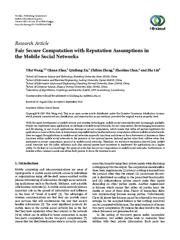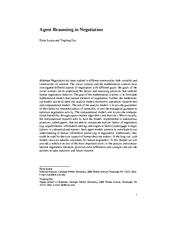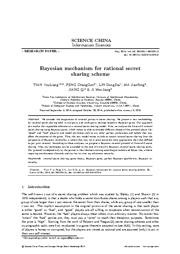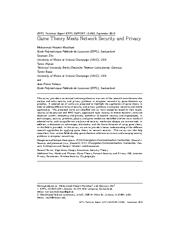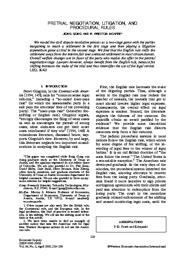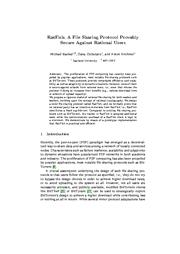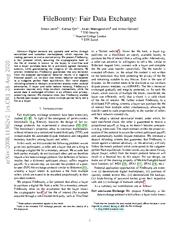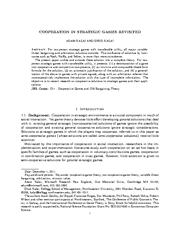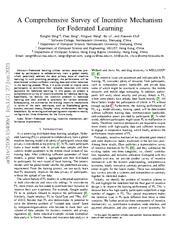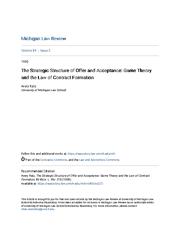A copy of this work was available on the public web and has been preserved in the Wayback Machine. The capture dates from 2019; you can also visit the original URL.
The file type is application/pdf.
Filters
Fair Secure Computation with Reputation Assumptions in the Mobile Social Networks
2015
Mobile Information Systems
Here we regard the applications in mobile social networks as specific functions and stress on the achievement of fairness on these functions within mobile social networks in the presence of two rational ...
Rational parties value their utilities when they participate in secure computation protocol in mobile social networks. ...
Disclosure An abstract of this paper has been presented in the INCOS2013 conference, pages 309-314, 2013 [35] . ...
doi:10.1155/2015/637458
fatcat:s7ptrf42j5fnljoy4ki3kogjhm
Agent Reasoning in Negotiation
[chapter]
2010
Advances in Group Decision and Negotiation
information seeking, and cognitive factors) and engage in negotiations in a decentralized manner. ...
Such agent models promise to contribute to our understanding of human information processing in negotiation. Additionally, they could be used for decision support of human decision makers. ...
Acknowledgements The current research has been supported by the ARO Multi University Research Initiative grant W911-NF-0810301. ...
doi:10.1007/978-90-481-9097-3_26
fatcat:y2ulmzex55c3vhcaw6ojwikzwa
Bayesian mechanism for rational secret sharing scheme
2015
Science China Information Sciences
We consider the cooperation of rational parties in secret sharing. We present a new methodology for rational secret sharing both in two-party and multi-party settings based on Bayesian game. ...
Our protocol is adopted only by the parties in their decision-making according to beliefs and Bayes rule, without requiring simultaneous channels and can be run over asynchronous networks. ...
is a sequential equilibrium. ...
doi:10.1007/s11432-014-5275-5
fatcat:vosfgnxgpvbapacrbtoge6zuq4
AN EXPERIMENTAL STUDY OF COMPUTER-BASED NEGOTIATION IN PROPERTY DEVELOPMENT PROCESSES
2014
International Journal of Strategic Property Management
This study also provides evidences that it is in the negotiators' concern to reach an agreement with a fair outcome, which is defined here as the equilibrium, regardless the availability of the information ...
We have also extended the experiment into three different negotiation games distinguished by the availability of information to the participants: a negotiation game with incomplete information, asymmetric ...
Suppose there are only two parties (A and B) engaged in the exchange of two valued resources, for instance x that is provided by A and y that is provided by B. ...
doi:10.3846/1648715x.2014.970597
fatcat:qqokpc6fznhwtpxe66a35rlspu
Game theory meets network security and privacy
2013
ACM Computing Surveys
This survey provides a structured and comprehensive overview of the research contributions that analyze and solve security and privacy problems in computer networks by game-theoretic approaches. ...
In each category, security problems, players, and game models are identified and the main results of selected works, such as equilibrium analysis and security mechanism designs are summarized. ...
In such computations, game theory can help parties perform certain protocols. MPC also can help parties in the game to achieve a certain equilibrium. ...
doi:10.1145/2480741.2480742
fatcat:55ixmohvijaelflxqrrbtnvfuu
SoK: Tools for Game Theoretic Models of Security for Cryptocurrencies
[article]
2020
arXiv
pre-print
This gives an overview of the available tools, and we look at their (potential) use in practice, in the context of existing blockchain based systems that have been proposed or implemented. ...
Cryptocurrencies have garnered much attention in recent years, both from the academic community and industry. ...
The game is parametrized by a multi-party functionality F and consists of two sequential moves. ...
arXiv:1905.08595v2
fatcat:qmg2qtn3avf4jlqaorbnix3t4e
Pretrial negotiation, litigation, and procedural rules
2000
Economic Inquiry
We model the ci¨il dispute resolution process as a two-stage game with the parties bargaining to reach a settlement in the first stage and then playing a litigation expenditure game at trial in the second ...
O¨erall welfare changes are in fa¨or of the party who makes the offer in the pretrial negotiation stage. ...
It is straightforward to compute the expected equilibrium outcome for the two parties under different signal configurations when ␣ is close to or equal to 0. 17 These values are presented in Table I . ...
doi:10.1093/ei/38.2.218
fatcat:lpxxg6jq2rdjpf624njn23ufem
Pretrial negotiation, litigation, and procedural rules
2000
Economic Inquiry
We model the ci¨il dispute resolution process as a two-stage game with the parties bargaining to reach a settlement in the first stage and then playing a litigation expenditure game at trial in the second ...
O¨erall welfare changes are in fa¨or of the party who makes the offer in the pretrial negotiation stage. ...
It is straightforward to compute the expected equilibrium outcome for the two parties under different signal configurations when ␣ is close to or equal to 0. 17 These values are presented in Table I . ...
doi:10.1111/j.1465-7295.2000.tb00015.x
fatcat:cgadkiqujzac3i5jybv56mvppe
Advances in Negotiation Theory: Bargaining, Coalitions and Fairness
2005
Social Science Research Network
By reviewing noncooperative bargaining theory, non-cooperative coalition theory, and the theory of fair division, this paper will try to identify the connection among these different facets of the same ...
How should the parties involved divide the gains from cooperation? With whom will one make alliances? ...
In other words, incompleteness in information can cause inefficient equilibrium outcomes. ...
doi:10.2139/ssrn.722363
fatcat:rehz72ye4rdajolvlrpgtcrnwe
RatFish: A File Sharing Protocol Provably Secure against Rational Users
[chapter]
2010
Lecture Notes in Computer Science
We design a novel file sharing protocol called RatFish, and we formally prove that no rational party has an incentive to deviate from RatFish; i.e., RatFish constitutes a Nash equilibrium. ...
The proliferation of P2P computing has recently been propelled by popular applications, most notably file sharing protocols such as BitTorrent. ...
To ensure fair exchanges, leechers first exchange the pieces in encrypted form and subsequently send the corresponding decryption keys. How an Equilibrium is Achieved. ...
doi:10.1007/978-3-642-15497-3_37
fatcat:adyhledtsveyzmmedqj3vc4rt4
FileBounty: Fair Data Exchange
[article]
2020
arXiv
pre-print
Our novel deposit refunding scheme is resistant to extortion attacks under rational adversaries. ...
perfect Nash equilibrium. ...
We show that honest behavior in FileBounty is a Nash equilibrium under a rational adversary. ...
arXiv:2008.11362v2
fatcat:ko6a6bwfbjfahcysrnycmif55y
Generic Superlight Client for Permissionless Blockchains
[article]
2020
arXiv
pre-print
Under such a game-theoretic model, we design a superlight-client protocol to enable a client to employ some relaying full nodes (e.g. two or one) to read the blockchain. ...
We conduct a systematic study on the light client of permissionless blockchains, in the setting where the full nodes and the light clients are rational. ...
1 Writing in the blockchain is trivial, as one can gossip with some full nodes to diffuse its messages to the entire blockchain network (a.k.a., network diffuse functionality [30, 7] ). ...
arXiv:2003.06552v2
fatcat:hkq3qabso5goxdxmqerg3rtjve
Cooperation in Strategic Games Revisited
2012
Quarterly Journal of Economics
information. ...
For two-person strategic games with transferable utility, all major variablethreat bargaining and arbitration solutions coincide. ...
21 It is necessary to specify how to act under such zero-probability events in order to argue, as we do below, that we have a sequential equilibrium. ...
doi:10.1093/qje/qjs074
fatcat:7pj4diac7za7pmw2h6uwydtafu
A Comprehensive Survey of Incentive Mechanism for Federated Learning
[article]
2021
arXiv
pre-print
By reviewing and comparing some impressive results, we figure out three directions for the future study. ...
In such promising paradigm, the performance will be deteriorated without sufficient training data and other resources in the learning process. ...
and incomplete information? ...
arXiv:2106.15406v1
fatcat:7v7adaw5wnbldhykma6mhgpnty
The Strategic Structure of Offer and Acceptance: Game Theory and the Law of Contract Formation
1990
Michigan law review
models can also differ depending upon whether the incomplete information is taken to be one-sided (only one party has information that the other does not) or two-sided (each party has some information ...
If one specifies the informational structure carefully, however, and if one assumes that parties understand the extent to which their information is incomplete, sequential equilibria for these games can ...
This dependence is shown in Figure 3 by two lines. The common law rule is represented by the broken and kinked line marked "Regime I." ...
doi:10.2307/1289373
fatcat:jcoea4y4ynfxdmirfzkuklzef4
« Previous
Showing results 1 — 15 out of 2,860 results

